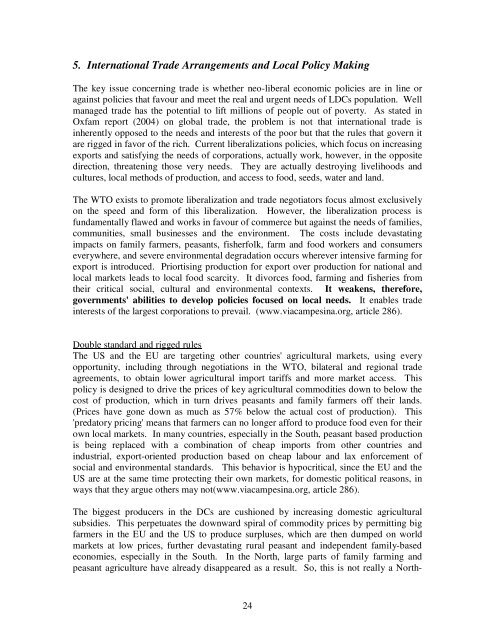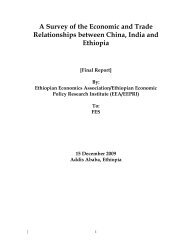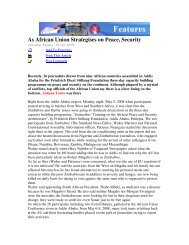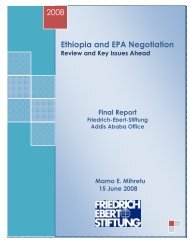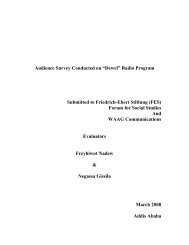external influence in the making of development ... - FES Ethiopia
external influence in the making of development ... - FES Ethiopia
external influence in the making of development ... - FES Ethiopia
You also want an ePaper? Increase the reach of your titles
YUMPU automatically turns print PDFs into web optimized ePapers that Google loves.
5. International Trade Arrangements and Local Policy Mak<strong>in</strong>g<br />
The key issue concern<strong>in</strong>g trade is whe<strong>the</strong>r neo-liberal economic policies are <strong>in</strong> l<strong>in</strong>e or<br />
aga<strong>in</strong>st policies that favour and meet <strong>the</strong> real and urgent needs <strong>of</strong> LDCs population. Well<br />
managed trade has <strong>the</strong> potential to lift millions <strong>of</strong> people out <strong>of</strong> poverty. As stated <strong>in</strong><br />
Oxfam report (2004) on global trade, <strong>the</strong> problem is not that <strong>in</strong>ternational trade is<br />
<strong>in</strong>herently opposed to <strong>the</strong> needs and <strong>in</strong>terests <strong>of</strong> <strong>the</strong> poor but that <strong>the</strong> rules that govern it<br />
are rigged <strong>in</strong> favor <strong>of</strong> <strong>the</strong> rich. Current liberalizations policies, which focus on <strong>in</strong>creas<strong>in</strong>g<br />
exports and satisfy<strong>in</strong>g <strong>the</strong> needs <strong>of</strong> corporations, actually work, however, <strong>in</strong> <strong>the</strong> opposite<br />
direction, threaten<strong>in</strong>g those very needs. They are actually destroy<strong>in</strong>g livelihoods and<br />
cultures, local methods <strong>of</strong> production, and access to food, seeds, water and land.<br />
The WTO exists to promote liberalization and trade negotiators focus almost exclusively<br />
on <strong>the</strong> speed and form <strong>of</strong> this liberalization. However, <strong>the</strong> liberalization process is<br />
fundamentally flawed and works <strong>in</strong> favour <strong>of</strong> commerce but aga<strong>in</strong>st <strong>the</strong> needs <strong>of</strong> families,<br />
communities, small bus<strong>in</strong>esses and <strong>the</strong> environment. The costs <strong>in</strong>clude devastat<strong>in</strong>g<br />
impacts on family farmers, peasants, fisherfolk, farm and food workers and consumers<br />
everywhere, and severe environmental degradation occurs wherever <strong>in</strong>tensive farm<strong>in</strong>g for<br />
export is <strong>in</strong>troduced. Priortis<strong>in</strong>g production for export over production for national and<br />
local markets leads to local food scarcity. It divorces food, farm<strong>in</strong>g and fisheries from<br />
<strong>the</strong>ir critical social, cultural and environmental contexts. It weakens, <strong>the</strong>refore,<br />
governments' abilities to develop policies focused on local needs. It enables trade<br />
<strong>in</strong>terests <strong>of</strong> <strong>the</strong> largest corporations to prevail. (www.viacampes<strong>in</strong>a.org, article 286).<br />
Double standard and rigged rules<br />
The US and <strong>the</strong> EU are target<strong>in</strong>g o<strong>the</strong>r countries' agricultural markets, us<strong>in</strong>g every<br />
opportunity, <strong>in</strong>clud<strong>in</strong>g through negotiations <strong>in</strong> <strong>the</strong> WTO, bilateral and regional trade<br />
agreements, to obta<strong>in</strong> lower agricultural import tariffs and more market access. This<br />
policy is designed to drive <strong>the</strong> prices <strong>of</strong> key agricultural commodities down to below <strong>the</strong><br />
cost <strong>of</strong> production, which <strong>in</strong> turn drives peasants and family farmers <strong>of</strong>f <strong>the</strong>ir lands.<br />
(Prices have gone down as much as 57% below <strong>the</strong> actual cost <strong>of</strong> production). This<br />
'predatory pric<strong>in</strong>g' means that farmers can no longer afford to produce food even for <strong>the</strong>ir<br />
own local markets. In many countries, especially <strong>in</strong> <strong>the</strong> South, peasant based production<br />
is be<strong>in</strong>g replaced with a comb<strong>in</strong>ation <strong>of</strong> cheap imports from o<strong>the</strong>r countries and<br />
<strong>in</strong>dustrial, export-oriented production based on cheap labour and lax enforcement <strong>of</strong><br />
social and environmental standards. This behavior is hypocritical, s<strong>in</strong>ce <strong>the</strong> EU and <strong>the</strong><br />
US are at <strong>the</strong> same time protect<strong>in</strong>g <strong>the</strong>ir own markets, for domestic political reasons, <strong>in</strong><br />
ways that <strong>the</strong>y argue o<strong>the</strong>rs may not(www.viacampes<strong>in</strong>a.org, article 286).<br />
The biggest producers <strong>in</strong> <strong>the</strong> DCs are cushioned by <strong>in</strong>creas<strong>in</strong>g domestic agricultural<br />
subsidies. This perpetuates <strong>the</strong> downward spiral <strong>of</strong> commodity prices by permitt<strong>in</strong>g big<br />
farmers <strong>in</strong> <strong>the</strong> EU and <strong>the</strong> US to produce surpluses, which are <strong>the</strong>n dumped on world<br />
markets at low prices, fur<strong>the</strong>r devastat<strong>in</strong>g rural peasant and <strong>in</strong>dependent family-based<br />
economies, especially <strong>in</strong> <strong>the</strong> South. In <strong>the</strong> North, large parts <strong>of</strong> family farm<strong>in</strong>g and<br />
peasant agriculture have already disappeared as a result. So, this is not really a North-<br />
24


